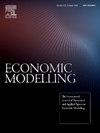气候变化的宏观经济影响:韩国意外天气条件的半结构分析
IF 4.2
2区 经济学
Q1 ECONOMICS
引用次数: 0
摘要
本研究调查了意外天气条件如何影响宏观经济活动,解决了更好地理解天气引起的经济冲击的结构性质的需要。虽然先前的研究依赖于简化形式的回归或结构模型,但潜在的机制往往是模糊的或依赖于模型的。我们提出了一种半结构方法,将韩国经济的结构向量自回归模型与简化形式的回归相结合,将已确定的结构性冲击与意外天气条件联系起来,以与历史常态的偏差来衡量。我们的分析表明,寒冷事件——加热度日数、冻结度日数和霜冻——与不利的供应冲击有关,而风暴和沙尘暴则表现为需求冲击。这些结果强调,天气引发的宏观经济冲击的类型取决于事件的性质和社会恢复能力。通过揭示天气事件在经济中传播的机制,我们的发现为更有针对性和适应性的气候政策应对提供了基础。本文章由计算机程序翻译,如有差异,请以英文原文为准。
Macroeconomic impacts of climate change: A semi-structural analysis of unexpected weather conditions in Korea
This study investigates how unexpected weather conditions influence macroeconomic activity, addressing the need to better understand the structural nature of weather-induced economic shocks. While prior research has relied on reduced-form regressions or structural models, the underlying mechanisms often remain ambiguous or model-dependent. We propose a semi-structural approach that combines a structural vector autoregression model of the Korean economy with reduced-form regressions linking identified structural shocks to unexpected weather conditions, measured as deviations from historical norms. Our analysis reveals that cold events – heating degree days, freezing degree days, and frost – are associated with adverse supply shocks, while storms and dust storms manifest as demand shocks. These results highlight that the type of macroeconomic shock triggered by weather depends on both the event’s nature and societal resilience. By uncovering the mechanisms through which weather events propagate through the economy, our findings offer a foundation for more targeted and adaptive climate policy responses.
求助全文
通过发布文献求助,成功后即可免费获取论文全文。
去求助
来源期刊

Economic Modelling
ECONOMICS-
CiteScore
8.00
自引率
10.60%
发文量
295
期刊介绍:
Economic Modelling fills a major gap in the economics literature, providing a single source of both theoretical and applied papers on economic modelling. The journal prime objective is to provide an international review of the state-of-the-art in economic modelling. Economic Modelling publishes the complete versions of many large-scale models of industrially advanced economies which have been developed for policy analysis. Examples are the Bank of England Model and the US Federal Reserve Board Model which had hitherto been unpublished. As individual models are revised and updated, the journal publishes subsequent papers dealing with these revisions, so keeping its readers as up to date as possible.
 求助内容:
求助内容: 应助结果提醒方式:
应助结果提醒方式:


